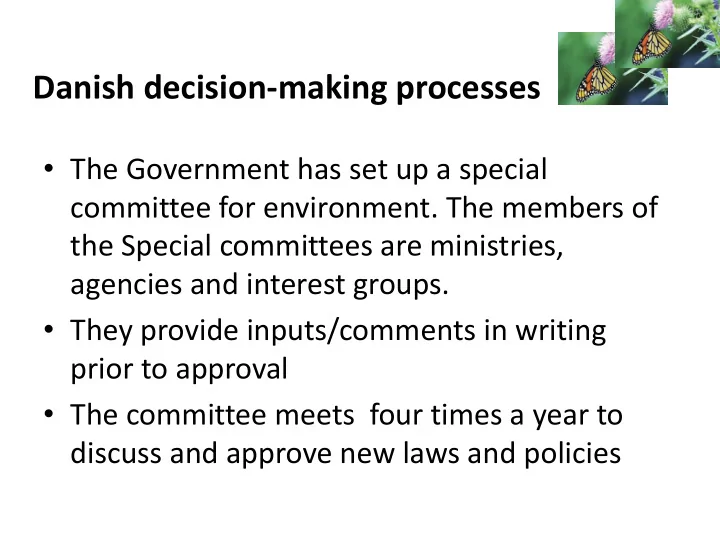

Danish decision-making processes • The Government has set up a special committee for environment. The members of the Special committees are ministries, agencies and interest groups. • They provide inputs/comments in writing prior to approval • The committee meets four times a year to discuss and approve new laws and policies
Law on species conservation – organization of its implementation • Nature Agency, Ministry of Environment was responsible – Representatives working in the field and from different units (forestry and subsidies) within the agency were engaged in the project • Involvement of Ministry of Environment • Involvement of the interest group on forestry and interest group on agriculture • Involvement of the Danish society of nature conservation (NGO)
Implementing actions As part of the preparation of the law a range of actions had been identified in close corporation with the interest groups and the Ngo: • A advisory service advising farmers and foresters on sustainable practices to protect species • Guiding principles for sustainable forestry • Greening of subsidies related to forestry and agriculture • Action plans for species • A leaflet to landowners • A guidebook for agriculture advisors.
Challenges • Lack of responsibility in regard to implementation • Communication between stakeholders having each their own agenda • Addressing problems instead of solutions • A perception that the Ministry of Environment should pay for any regulation and constraints the law might place on the sectors • Structural and technical constraints especially related to ‘greening of subsidies’
Change of strategy • Many meetings with ministry of environment, the interest groups and the Ngo • The interest groups and the NGO were asked to provide specific proposals which could meet their concerns • Than lead to active participation, greater ownership and more responsibility in regard to finding appropriate solutions
Lessons learnt • A legal framework is essential for mainstreaming • Organization/institutional arrangement which allow for inter-ministerial as well as stakeholder consultation is essential • Engagement of key stakeholders in all stages: formulation of legal framework and implementation including development of actions • It takes time to find appropriate solutions • Dialogue and active engagements is crucial
Recommend
More recommend